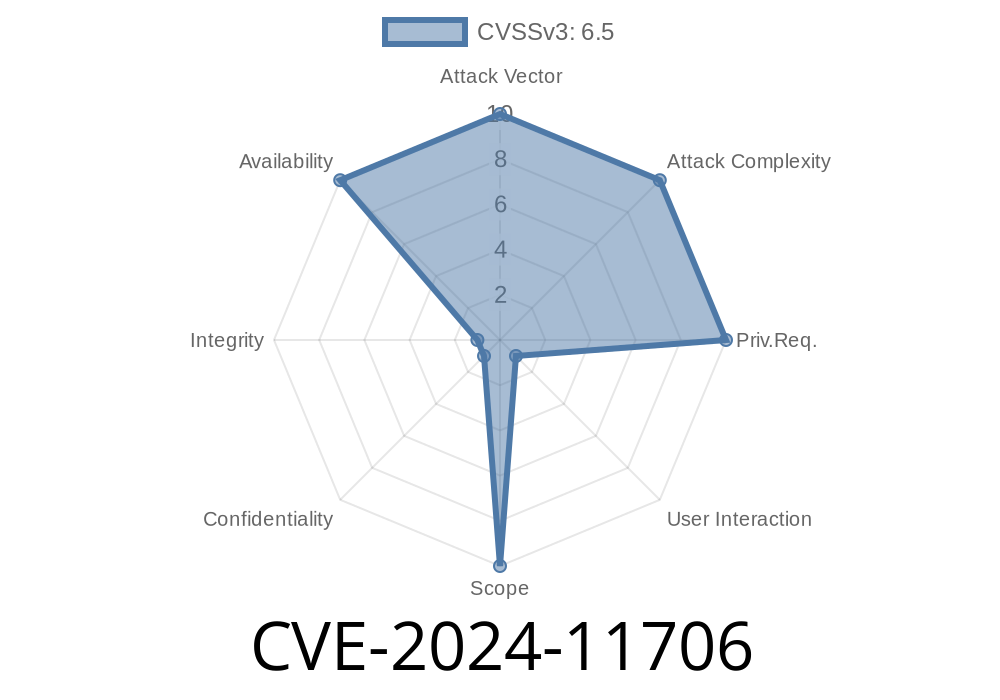In early 2024, a security flaw tagged as CVE-2024-11706 was discovered in the way Mozilla's pk12util tool handles certain certificate-related files. The bug affects Firefox before version 133 and Thunderbird before version 133. This post breaks down the technical details of the vulnerability, shows how malformed input may trigger the bug, and discusses its exploitation.
What is pk12util and Why Does It Matter?
pk12util is a command-line utility that comes with Mozilla's Network Security Services (NSS). It's typically used to import or export personal certificate and key information in PKCS #12 format—a common storage format for cryptographic objects.
Because this utility deals directly with cryptographic materials and user input, any flaw in its handling of data can have serious consequences.
The Vulnerability: Null Pointer Dereference in SEC_ASN1DecodeItem_Util
The heart of CVE-2024-11706 is a null pointer dereference in the SEC_ASN1DecodeItem_Util function. A null pointer dereference occurs when a program tries to read or write memory at address zero, leading to a crash. This makes the tool vulnerable to Denial of Service (DoS) attacks.
Where is the Bug?
The bug surfaces when a specially crafted, malformed, or improperly formatted PKCS #12 file is provided as input to pk12util. The root of the issue is insufficient validation of return values during ASN.1 (Abstract Syntax Notation One) decoding. If part of the decode process fails, a pointer expected to hold valid data may instead be NULL. When the function later assumes the pointer is safe to use, the program crashes.
Example: How the Flaw Can Be Triggered
Below is a simplified representation of C code to help visualize the problem. (Note: The actual codebase is much more complex, but this illustrates the bug.)
SECStatus
SEC_ASN1DecodeItem_Util(SECItem *dest, void *template, const SECItem *src) {
void *decoded = SEC_ASN1DecodeTemplate(NULL, template, src);
// Bug: decoded may be NULL if decode fails!
if (decoded == NULL) {
// Missing: graceful error handling
}
// ... code goes on to use 'decoded' without checking ...
memcpy(dest, decoded, sizeof(SECItem));
// This can crash if 'decoded' is NULL!
}
What’s wrong?
If SEC_ASN1DecodeTemplate returns NULL (due to a bad input file), the next line blindly dereferences decoded, leading to a program crash.
A minimal malformed PKCS #12 file could look like this (not a real file, just a demonstration)
MIIA..... (truncated base64)
If you feed a broken file like this to pk12util
pk12util -i ./malformed.p12 -d ./certdb
The program may crash with a segmentation fault if you are running a vulnerable version.
Impact
- Denial of Service (DoS): The most immediate impact is that pk12util (and possibly processes invoking it, like Thunderbird or Firefox background tasks) will crash when handling a dangerous file.
- Remote Exploitability: While this flaw is local in pk12util, users might be tricked into importing malicious certificates in email clients or browsers, leading to instability.
- Privilege Elevation: There is no current evidence that this bug leads to code execution or privilege escalation, but it could help an attacker learn more about memory layouts or behavior of the tool in edge cases.
On Linux, a user might see
Segmentation fault (core dumped)
Responsible Disclosure and Fix
Mozilla patched this flaw in Firefox 133 and Thunderbird 133.
- Firefox Release Notes 133
- Thunderbird Release Notes 133
- NSS Library GitHub
Fix Status:
The patch ensures that pk12util checks if the decode function returned NULL before using the result, preventing crashes from malformed files.
Be Careful: Don’t import or open PKCS #12 files from untrusted sources.
- Stay Informed: Follow your Linux/BSD/Windows package manager or software updater for patches to NSS libraries.
Original References
- Mozilla Security Advisory MFSA 2024-13
- Bugzilla Bug #186889
- CVE Record
Conclusion
CVE-2024-11706 is a classic example of how subtle errors in input validation can open the door to crashes and attacks. The fix was simple—properly check return values before using them. The lesson applies everywhere: always validate input, and never assume a pointer is safe to dereference unless you've checked.
If you are a sysadmin or developer, update your software and encourage your users to do the same. A little vigilance prevents a world of hurt!
Timeline
Published on: 11/26/2024 14:15:20 UTC
Last modified on: 11/26/2024 17:15:23 UTC
